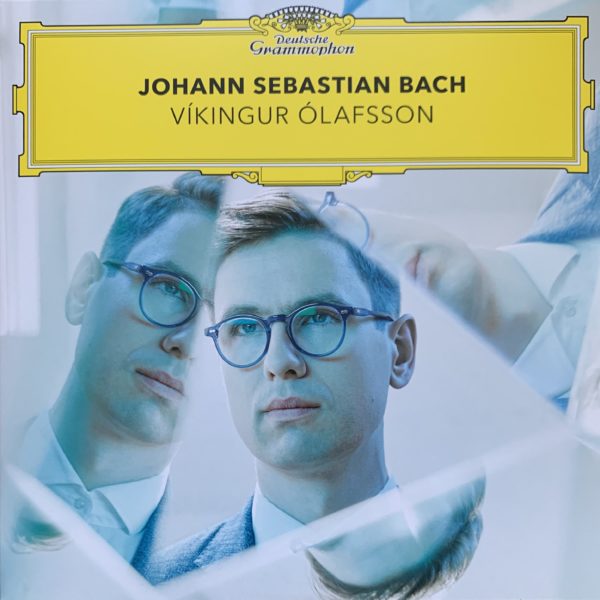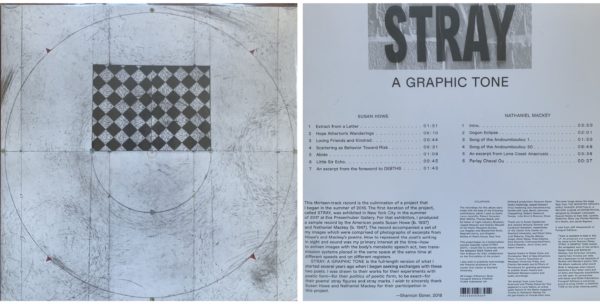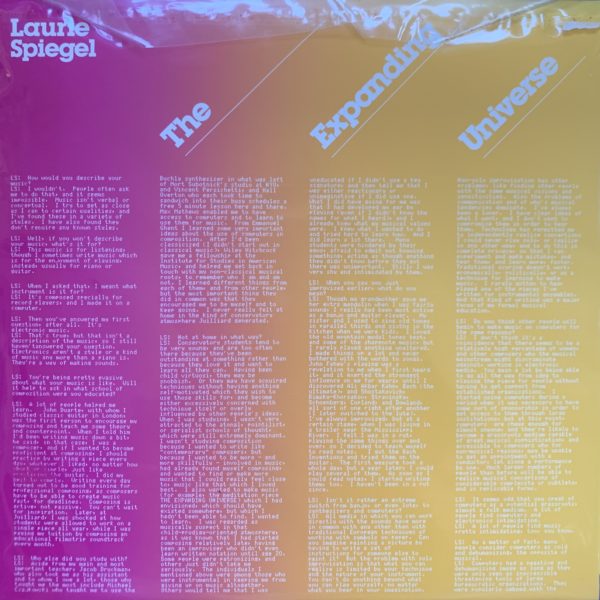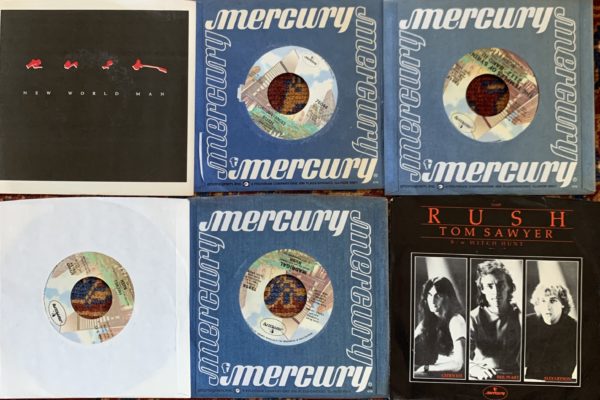[You can learn more about Peter here.]
Víkingur Ólafsson, Johan Sebastian Bach (Deutsche Grammaphon, 2018): When Ólafsson released his extraordinary versions of Philip Glass’s piano pieces in 2017, I became a committed fan. So much poise. His Bach double LP is so forceful, so good, such a refreshing tonic. It’s accompanied by Bach Reworks, full of appealing electronic versions and remixes by a host of mostly Icelandic artists. Ólafsson just released another double LP putting Rameau, the late-Baroque French composer, in conversation with Debussy. Also: So photogenic!
Susan Howe/Nathaniel Mackey, Stray: A Graphic Tone (Fonograf/ROMA, 2018): Neither Howe nor Mackey, two of the greatest living American poets, is a stranger to recording and performing their poetry. For years, Howe has ingeniously collaborated with David Grubbs to create soundscapes of language and pattern repetition. Likewise, Mackey, who has issued a CD of readings from “Song of the Andoumboulou,” one of his two ongoing serial poems (the other is called “Mu,” named after Don Cherry’s series), has taken to performing his poetry readings with improvisers. “Stray: A Graphic Tone” makes use of archival and more recent recordings to give a sense of these poets’ excellence. In an age of poets’ recordings proliferating on the internet (which is very much a good thing), I gotta say, nevertheless, it’s nice to have poetry on vinyl.
Laurie Spiegel, The Expanding Universe (Unseen Worlds, 2018): I prefer to listen to repetitive, minimalist, and ambient music when I work – by which I mean, when I am grading student essays, which pins me to my computer. I discovered Spiegel’s groundbreaking work from 1980 thanks to an algorithm on Spotify. My gratitude for that artificial semi-intelligence is immense. These grooves are hypnotic. In a lucid self-interview printed on the cover this vast triple LP, Spiegel, who worked at Bell Labs, describes, “This music is for listening.” This prompts her to ask herself, “When I asked that, I meant what instrument is it for?” To which she replies to herself, “It’s composed specially for record players, and I made it on a computer.” “Patchwork,” the opening track, “consists of relationships among four short melodic motives and four rhythmic patterns.” It’s deep – and hard to stop listening to. Here’s an interview with Spiegel from 1984. “A synergistic oscillation.”
Kamasi Washington, The Epic (Brainfeeder, 2015): I love this album, which Zach encouraged me to buy when I met him at Dusty Groove a few years ago. Of epic, Georg Lúkacs wrote that epic creates distances and that epic distance “means happiness and lightness, a loosening of the bonds that tie men and objects to the ground, a lifting of the heaviness, the dullness, which are integral to life and which are dispersed only in scattered happy moments. The created distances of epic verse transform such moments into the true level of life.” Washington’s “Epic” contains everything I want in an art of grand distances and minute perceptions. I had the good fortune to see Washington and his band perform at the Riviera in Chicago on November 3, 2018, one of the best concerts I’ve ever seen. I was especially struck by how attentively Washington listened to his bandmates – he was so focused on their solos and collaborations. He was the consummate visionary bandleader, and reflecting on that concert, he offered a model of how to proceed during these tumultuous times: leading with imagination, performing when called on, and listening always.
Rush, various singles (1970s/1980s): Rick Wojcik, Dusty Groove’s proprietor, gave these singles to me as a Christmas gift. They came from a juke box collection. Rick knows – and shares – my deep love of Rush. You don’t necessarily get to choose what encounter at which time in your most formative and impressionable period is going to alchemize your elements and transmute them into art, but for most artists this happens rarely. Awkward kid alienated from his suburban surroundings with a love of fantasy and sci-fi turns into an artist (a poet in my case) is not in itself so unusual. But how fortunate to have had Neil Peart to initiate that transformation! When he died back in January, I felt a pang of loss which compelled me to listen repeatedly to the music and to watch all the documentaries one more time. (“Rush: Beyond the Lighted Stage” is so good.) One song that’s been running through my head repeatedly in the past month is “Natural Science,” the track that concludes Permanent Waves. Specifically, these lyrics (and forgive the long quotation), “Art as expression, / Not as market campaigns / Will still capture our imaginations / Given the same / State of integrity / It will surely help us along // The most endangered species / The honest man / Will still survive annihilation / Forming a world / State of integrity / Sensitive, open and strong.” Okay, very proggy, but can you think of another rock song that uses “sensitive” as an adjective of praise?
Knapsack, “Twelve Degrees,” (2020): Knapsack plays all of the instruments on this song, except the drums, which are played by underscores. Note the glockenspiel in the opening. This choice is extremely prejudiced. Knapsack is Gabriel O’Leary, my son. In his own words, he’s studying how to be a pop musician at the Clive Davis Institute for Recorded Music at NYU. It’s okay!





